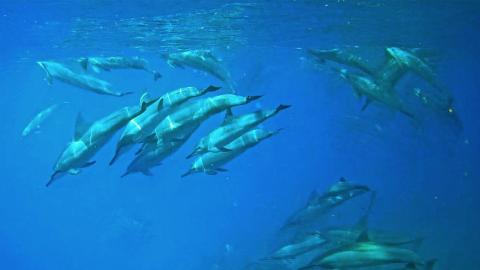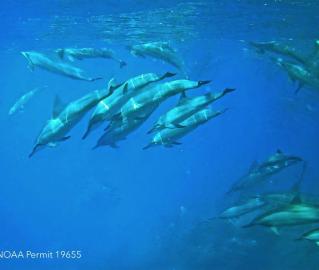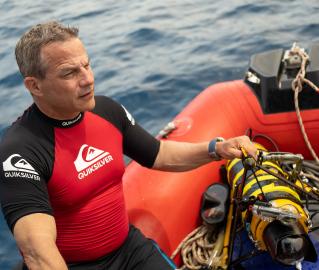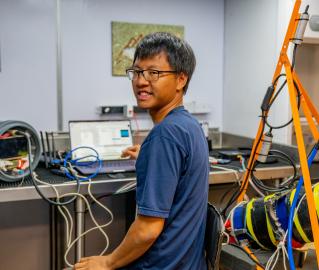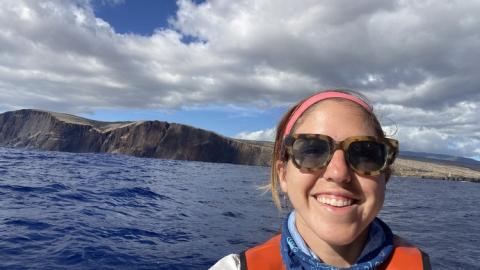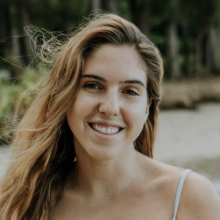
Carissa Cabrera
What is your history of engagement with the National Geographic Society?
I was a recipient of a COVID-19 Emergency Fund for Educators Grant during the height of the pandemic to support educators with virtual resources. We launched a 5-day virtual curriculum called Ocean Connections for middle school students to increase their ocean and climate literacy through engaging, but remote, lesson plans and activities. This lesson plan development and distribution was made possible by National Geographic funding and support.
Tell us about your work/research. What kinds of things do you do?
I specialize in using media and community building to scale conservation impact and projects. As an educator, creative, and conservationist, I founded The Conservationist Collective to create pathways for everyone to become involved in marine conservation. We lead projects independently and in partnership with institutions and large nonprofits, including hosting and leading events, producing short films, hosting a conservation communication podcast, and sharing solutions via media channels. Through the lens of education and community-oriented solutions, the objective of our work is to advance ocean-climate solutions that are primarily nature-based.
What sparked your initial interest in your career?
My initial interest in this career was sparked through formative, cherished memories in the ocean during my childhood. It wasn't until I took my first conservation course in college that I realized my marine science career would be centered around conserving, restoring, and protecting the sea due to the overwhelming threats it faces. I pivoted to develop skills like education and outreach, program design and execution, and gain invaluable experience in nonprofit work. To this day, the best work I do comes from connecting with others over the importance of our shared ocean.
What element of your work/study do you think is the most fascinating?
The most fascinating part of my work is that the evolving field of media is enabling marine conservation to reach millions of people. In the last month alone, short-form videos about the importance of ocean-climate solutions have reached over 2 million views on one social media channels. Harnessing these platforms to get needed messaging about our natural world is imperative to the implementation of climate solutions.
What other jobs or skills led you to your current position?
I've had the incredible privilege to hold leadership roles in nonprofits related to protecting marine species like cetaceans, sea turtles, seabirds, and more. I was the programs manager for a marine animal rescue in Hawai'i, and an Education Manager for a cetacean stranding lab. I've been project manager of a conservation funding policy locally for the past year in partnership with Conservation International, and consulted with universities like Harvard on effective science communication strategies. This summer I launched a short film in partnership with Waterbear, using video and media skills I've developed in the last two years. I've learned that all of these roles make me a more effective conservationist, and am always excited to get outside of my comfort zone and try something new. The larger my toolkit, the larger my impact.
What are your degrees and certifications?
I hold a Bachelor of Science in Ecology and Evolutionary Biology from the University of Arizona with a minor in Marine Science 2016; Masters of Science in Marine Science from Hawai'i Pacific University 2018
What are your hobbies?
My favorite hobbies are surfing, photography, and I've recently taken up learning how to rock climb!
What advice would you give someone who wants to have a career like yours?
My biggest advice is to create opportunities for yourself, because it is up to you to hone and develop skills related to your end goal. If you want to conserve the ocean, then source an organization doing the work you want to do and learn from them. I would also overemphasize the importance of relationship building, as that is how opportunities are created. In your early career and younger years, say yes to many things to figure out what you love and what you don't. I originally thought I wanted to be in the field, but I know now that I'm best in a management and design role and feel most fulfilled in community spaces. Find a mentor, learn from others, and never be afraid to send an email!
Expeditions
Carissa participated in the following Ocean Exploration Trust expeditions:
